"I really enjoyed my time on the course. In a simple and practical manner, I learned how to obtain results from AFM. I entered the course without ever being on the same lab with an AFM and left being able to carry out an experiment and analysing my own results."
Last week, we held our AFM workshop for 2013, here in Porto. We had students from Portugal, Spain, Germany, Romania, Denmark and Norway.
The students enjoyed the course a lot, and we got lots of very positive feedback.
The students enjoyed the course a lot, and we got lots of very positive feedback.

"I have to tell you that I'm enjoying a lot this mini-course. The language used to explain the concepts is very clear and there is a good atmosphere between all participants."
This is the second time we've run the course, and the first time in Porto. Last time we ran it in Lisbon. We brought one AFM up from our lab in Lisbon, so the students had access to two instruments.
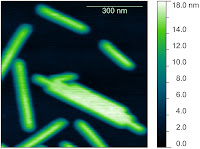 On the first day, after meeting the students, we started with a short introduction to AFM, followed by a talk about AFM instrumentation, focussing on important concepts, and the differences between different instruments the students might encounter. Some of the students were already using AFM, and some had never used it. In fact, a couple of the students were already regular AFM users, but still found the course useful:
On the first day, after meeting the students, we started with a short introduction to AFM, followed by a talk about AFM instrumentation, focussing on important concepts, and the differences between different instruments the students might encounter. Some of the students were already using AFM, and some had never used it. In fact, a couple of the students were already regular AFM users, but still found the course useful: "I found it useful even for people (like me) having a certain experience in the field. For instance, things that work well in/with AFM can be easily found in a lot of papers, but things that are hard or tricky to set up are seldom explicitly written in articles. The workshop addressed specifically this type of issues. Also, to my opinion, attending the workshop was not expensive at all. "
After lunch on the first day, we looked at AFM modes, including topographic (imaging ) modes, and property modes. This was the longest talk of the course, and I could see that the students welcomed the coffee break afterwards! We finished this day with a brief overview of AFM applications.
"In my opinion, the course was very organized at all levels. The schedule was well balanced with the coffee-breaks at the right time, I mean; they were on that critical point that we need to make break. Not that the classes were messy or boring. Not at all!"
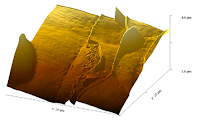 On the second day we started off with a talk on sample preparation, doubtless one of the most important topics for any AFM user. I did a little demo
On the second day we started off with a talk on sample preparation, doubtless one of the most important topics for any AFM user. I did a little demo  of using freshly-cleaved mica during this talk, and Jorge gave the students plenty to think about! During this day we also extracted a hair from Leonor and she prepared it for scanning on the following day. This talk was followed by my guide to AFM operation, including important stuff like feedback optimisation and a short run-through of what we'd do in the instrument class the next day. After lunch we finished off the main part of the course with talks on data processing techniques and artefacts and problems in AFM.
of using freshly-cleaved mica during this talk, and Jorge gave the students plenty to think about! During this day we also extracted a hair from Leonor and she prepared it for scanning on the following day. This talk was followed by my guide to AFM operation, including important stuff like feedback optimisation and a short run-through of what we'd do in the instrument class the next day. After lunch we finished off the main part of the course with talks on data processing techniques and artefacts and problems in AFM."The course was definitely worthwhile. Underlying concepts were expertly presented and explained. Hands-on with the instruments served to further illustrate the possibilities and challenges associated with the technique. The vast array of possible applications was also demonstrated. After completion of the course, I feel genuinely interested in the technique."
Finally, we had two excellent lectures from invited speakers. Firstly, Rui Rocha from the CEMUP in Porto gave a talk on materials applications of AFM. A real highlight of this talk for me, was that Rui showed us some results obtained by Arlete, one of our students on this course two years ago! Another nice aspect was that Rui spoke about application of many of the techniques that we'd 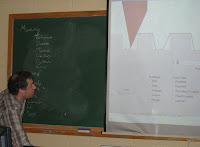 discussed the theory of earlier in the course.
discussed the theory of earlier in the course.
 discussed the theory of earlier in the course.
discussed the theory of earlier in the course.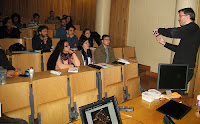
This was followed by an outstanding talk from Simon Connell of the University of Leeds, UK. This talk, "Dynamics in Biological AFM" had lots of great examples of using AFM to get really useful data to answer biological questions. This was really one of the best talks on AFM I have ever heard. Simon could have (and nearly did!) gone on for hours but we all wanted to get ready for the course dinner.
"It was great to share opinions/stories/experiences with all of the students/professors attending the course, specially at the dinner, which was in an amazing place, thank you for that!"
We went over to Vila Nova de Gaia to visit the "Caves Taylor" - Taylor's Port wine lodge - where we had a very interesting guided tour, and learned a lot about Port wine, followed by a visit to Taylor's excellent restaurant, with their fantastic view over the Douro river to Porto. Judging by the way the Port went down, the course made for some thirsty students!

"The dinner in caves Taylor was a great idea, showing the best view of Porto for the foreign students."
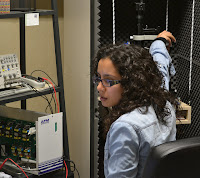 The third day was given over to sample scanning. We had one instrument set up for large samples and one for smaller samples at higher resolution. The students did really well, and as demonstrated by their images shown on this page, they scanned a lot of different samples! This is always the most fun part of the course, and it was very rewarding seeing the students enjoying the work so much, and to hear their questions, which showed they'd really been listening in the lectures.
The third day was given over to sample scanning. We had one instrument set up for large samples and one for smaller samples at higher resolution. The students did really well, and as demonstrated by their images shown on this page, they scanned a lot of different samples! This is always the most fun part of the course, and it was very rewarding seeing the students enjoying the work so much, and to hear their questions, which showed they'd really been listening in the lectures.One the last day, we had a class on data analysis and image processing. I demonstrated the techniques with the projector, and the students, all managed to follow  each step. Again, this more practical part was enjoyed a lot, and this part is particularly worthwhile for current AFM users who often struggle to process the images well. The students worked with the images they had collected on the day before and my example images, and as you can see from the images on these pages that they processed, they really got on well with the program. I offered a prize for best image, and that really motivated the students!
each step. Again, this more practical part was enjoyed a lot, and this part is particularly worthwhile for current AFM users who often struggle to process the images well. The students worked with the images they had collected on the day before and my example images, and as you can see from the images on these pages that they processed, they really got on well with the program. I offered a prize for best image, and that really motivated the students!
 each step. Again, this more practical part was enjoyed a lot, and this part is particularly worthwhile for current AFM users who often struggle to process the images well. The students worked with the images they had collected on the day before and my example images, and as you can see from the images on these pages that they processed, they really got on well with the program. I offered a prize for best image, and that really motivated the students!
each step. Again, this more practical part was enjoyed a lot, and this part is particularly worthwhile for current AFM users who often struggle to process the images well. The students worked with the images they had collected on the day before and my example images, and as you can see from the images on these pages that they processed, they really got on well with the program. I offered a prize for best image, and that really motivated the students!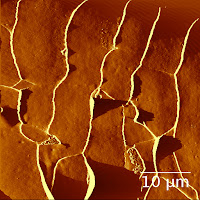 I really enjoyed the course, and we got some great feedback, as you can see from the quotes on this page. If you are interested in a similar course, check out our sponsors, AFM Workshop. Click the link to go to the description of their upcoming 5 days course that I will also teach in. Thanks to AFM Workshop for their financial support, as well as the Faculty of Sciences of the University of Porto. More images from the course can be seen here.
I really enjoyed the course, and we got some great feedback, as you can see from the quotes on this page. If you are interested in a similar course, check out our sponsors, AFM Workshop. Click the link to go to the description of their upcoming 5 days course that I will also teach in. Thanks to AFM Workshop for their financial support, as well as the Faculty of Sciences of the University of Porto. More images from the course can be seen here.


